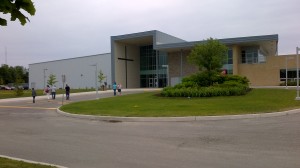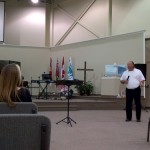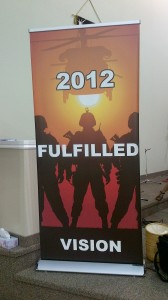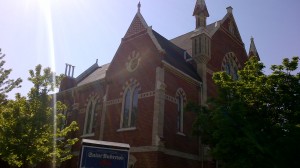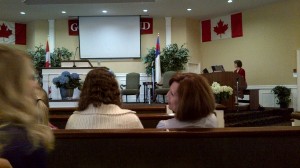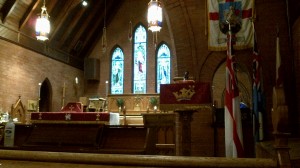Another first for me; I’ve never visited a Kingdom Hall before. I received a flyer through my door for a special service to be held on Tuesday night, so I jumped at the chance to add another checkmark to my church crawl.
It’s probably impossible for me to be truly objective about my visit, given the lectures that I’ve sat through on ‘Debating with Jehovah’s Witnesses’, and the strong antagonism between Evangelicals and JWs that I’ve observed. But I’ll do my best.
First, my initial impressions. Like most Kingdom Halls, this one was a squat, windowless building, definitely built for function rather than for decoration. It was full to capacity, but I got the feeling that this was the JW equivalent of the ‘Christmas and Easter’ crowd. I estimated around 150 to 200 people present, but we were informed at the end of the service that there were 181 in attendance.
So, lesson one about Jehovah’s Witnesses: they really like accurate headcounts.
In general, the folks there were very friendly, and I was taken aback by how many knew my name. I would also guess that this was the most demographically diverse congregation I’ve visited so far; a wide range of ages and ethnicities were represented.
In many ways the service felt like a conservative Baptist or Brethren church. There was an opening song, a prayer, and then a talky bit of around 45 minutes. Because this service was one of the highlights of the JW year, the talk was designed to give an overview of their theological distinctives. To me, it felt like the first two thirds of the sermon would not be out of place in a church in the Reformed tradition. We needed to have our Bibles on hair-trigger responses, as the speaker jumped from reference to reference. I’d say at least once every minute I heard ‘friends, let’s open our Bibles to…‘
I’m beginning to think of this approach as ‘Lego Hermeneutics’ – dip into a big bucket of bible verses, pull out a selection, stick them together end to end, and call the resulting contraption a formal theology. I sometimes wonder what would happen if we took this approach to other forms of literature. What would the underlying message of, say, War and Peace, be if we took 10 random sentences from it and strung it together?
Be that as it may, the first two thirds of the sermon would be familiar territory for anyone in a Reformed tradition, with lots of talk about sin, sacrifice and ransom. But around the 30-minute mark, we got the JW theological distinctives. In this system, ‘heaven’ is a reward for only 144000 specially chosen individuals, and is seen as very distinct from an ‘earthly paradise’ available to a greater number.
tradition, with lots of talk about sin, sacrifice and ransom. But around the 30-minute mark, we got the JW theological distinctives. In this system, ‘heaven’ is a reward for only 144000 specially chosen individuals, and is seen as very distinct from an ‘earthly paradise’ available to a greater number.
What fascinated me most about this unique reading of Revelation 7 was how it affected the manner in which the congregation took Communion. When it came time, a plate with bread on it was passed solemnly along the pews, and then returned to the front. Likewise, glasses of wine were passed around the congregation and then returned.
Untouched.
Seriously, four glasses went out, and four glasses came back, without a sip having been taken.
This is the only time that I have ever been invited to a meal, had the food laid out in front of me, and then watched as the host and all the guests carefully refused to eat.
Also, this is one of the few places I’ve attended that didn’t have coffee available after the service, too.
I’m a passionate believer in the value of eating together. Tonight, 40 of my friends will be invading my kitchen to eat and to to talk and to remember the last meal that Jesus shared with his disciples. And I can assure you that when bread or wine arrives at my table, I’ll enjoy it, not pass it back silently to the kitchen.
